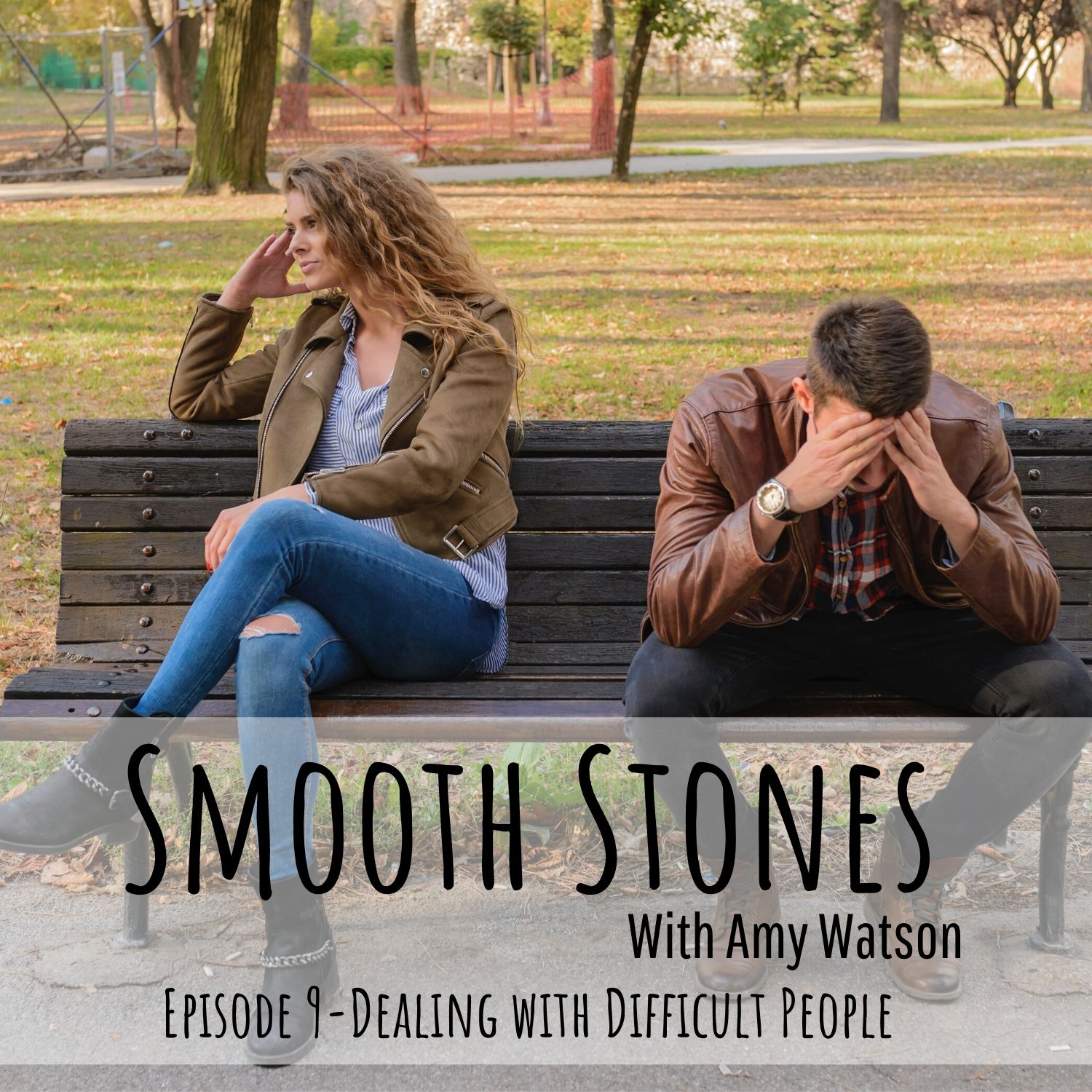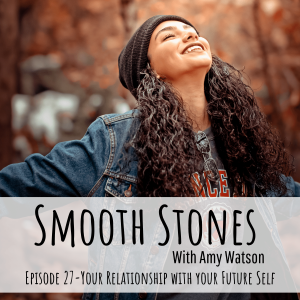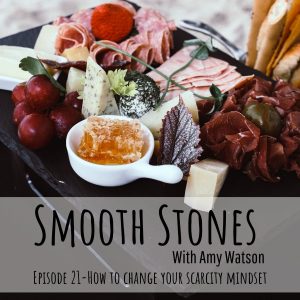All of us have people in our lives who are difficult to deal with, for many reasons. They drive us crazy or make us feel terrible.
But what if they can’t actually make us feel anything?
What if we could learn to love them, just as they are?
Join me on this episode as we learn new ways to deal with the difficult people in our lives, without them having to change at all.
If you have any questions, let me know here:
http://smoothstonescoaching.com/work-with-me
If you would like to share your baby’s story on the podcast, submit here: http://smoothstonescoaching.com/podcast-submissions
For a free 30 minute session, click here to schedule:
http://smoothstonescoaching.com/free_mini
photo by Vera Arsic on Pexels
Music by ZingDog on Pond5
Transcription
Hey, friends. How. Are you welcome to episode nine. I am sitting here in my office, which I just got organized finally. I’ve had just stuff all over in different rooms, and this used to be my guest room slash sewing room, which I do a lot of angel baby sewing or I used to. Before my last baby was born, and he’s made it really difficult to sew, but I just finally decided to make a goal and to get this done.
And it is almost there and it is so nice to walk in and be able to find everything and see everything and just been awesome. And of course it didn’t take as long as I thought it would, so I’m glad that I got that done. And. I wanna challenge you that if you have a project that’s been bugging you or a room in your house that you, you know, needs a little love, just make a goal and go after it.
You can even set a timer and do 15 minutes, ’cause we can pretty much do anything for 15 minutes. So that’s my challenge this week. Go ahead and get one of those projects done, and I’d love it if you would let me know what you did. I love a good before and after. I think I might have mentioned I’m a little bit of an H G T V addict, so I love a good before and after picture.
You can send those over to me by email or on Instagram dmm me. That’d be awesome. I am Amy Dot Smooth Stones Coaching. What else? We just passed Thanksgiving. We had a pretty low key day and lots and lots of food. Way too much food, but it was really great. Speaking of the office, my daughter who just had surgery, she’s my oldest.
She has been watching the TV series, the Office. We are pretty strict on what we let our kids watch, and so she’s never been allowed to watch it, but of course all her friends have seen it and she is the last person on earth that hasn’t seen the office, so we let her watch it while she’s been recovering.
And so today I’m gonna use a few examples from the office. If you haven’t seen it, you totally need to watch it. It’s on Netflix. We thought it was gonna be taken off at the end of this year, but it’s actually the end of next year. So I think you have like 13 months to watch nine seasons of the office if you never have, or if you need to watch it again.
We are gonna talk about difficult people, and I think Michael in the office is a. Great example of someone who would easily be labeled difficult. He is that boss that just is cringey and needy and way too involved in his employee’s lives. And he says the wrong thing and. It’s just a lot. If you’ve watched it, you know exactly what I’m talking about.
Okay. So we all have difficult people in our lives. We have these people that challenge us, that bring up all these emotions and cause us all kinds of problems. And I know that this can be a really sensitive subject, but I think that this one concept of how to deal with difficult people in our lives is just.
It’s so amazing and it’s so useful because we live in a world that is relationships, right? Even if you’re a little more introverted, you, you kinda keep to yourself and you’re good with that. We still just have so many relationships in our lives and that’s not going to change. So learning how to manage these people is gonna be so helpful for you.
So I hope that these tips that I’m gonna teach you today, Really give you a little bit of a different perspective and help you as you navigate all of this. So another example of maybe a difficult person could be your friend who wasn’t there for you during your grief, during your loss, and even now maybe is.
A tricky person. We all kind of have friends and that are harder for us to deal with. It could be your neighbor who always complains about your dog or your kids. It could be that mom on the P T A who always shoots down your ideas and wants it her way. It can be a close family member. It often really is the people who push our buttons the most are those ones that are the closest to us.
It could even be a child who just challenges you every day, right? Like, as you guys know, I have toddlers to teenagers and middle schoolers, and there’s kids that are just gonna sometimes be more challenging, right? For whatever reason. So the first thing I wanna talk about as you. Think of who the difficult people in your life are.
Just keep them in mind as I go through these, but I want you to know that other people do not have power over our emotions, period. The things they do, the things they say can’t make us feel. Anything. Now I know that we all have our stories and you’re gonna say, Amy, you don’t understand. Listen, this is what this person did.
This is how they treat me. You don’t understand how hard it is to deal with this person. Listen, I hear you. I know this, but. These people do things and we seem to just react emotionally. It seems involuntary, right? They do something. We feel the emotion. There doesn’t seem to be anything in between, but there always is a thought in between, and this is the way our brain works when we’ve been dealing with something for a long time, or in this case, someone.
Our brain likes to delegate down to, to our lower brain. So once it’s created this pathway, it’s gonna just keep doing it over and over until we can’t even really identify what the thought is that’s causing that emotion. But there always is a thought, and we really need to pay attention and break it down so that we can identify this.
And then we can practice redirecting up to our higher brain, which is our prefrontal cortex, where we can make intentional decisions in our relationships. And this is really, really important to know, right? So that lower brain is just like, we don’t have to tell ourselves how to drink a glass of water, or how to breathe, or how to brush our teeth.
Our brain just knows how to do it. Right, and that’s what the pattern we get into with these people in our lives. We just always go back to that default. But we’ve gotta interrupt that If we want to change the relationship we have with them, the next thing we wanna learn is to watch out for labels. Think about those people who are difficult for you in your life.
How would you describe them? Maybe they’re rude or arrogant. They could be nosy or judgemental. Maybe they’re uncaring or they could even be perfect, right? There’s those people that are perfect, but it’s not really a, a positive description. It’s like they’re so perfect, we can’t stand them. Okay? When we use these labels, we create a lens for our brain.
It’s gonna filter everything through it. Like when a teenager is obsessed with a celebrity, it doesn’t matter what they do, they are gonna love all of it. Okay? You all remember this. You’ve been there. Everything they do is just magical. Or on the flip side, like if you think your sister-in-law is always judging you, everything she does and says goes through that lens.
And you most likely aren’t gonna show up as your best self. ’cause all you can see is how she’s judging you. No matter what she does, this is where we need to break down what the people are actually doing and then how we are labeling it. And if we were doing a model, which we talked about, um, in a previous episode, this would be break it down into a factual circumstance.
So what are they actually doing? What did they say? What behaviors did you observe that made you label them as rude or arrogant? Judgmental. Okay. I’m gonna give you a couple of examples. The first one is burping. Okay? This is the action. If you had someone over for dinner and after the meal, they burped really loudly.
Multiple times you would think they were rude. You would wonder where they learned their manners and why they thought this was okay. And. All of these thoughts would go around as like even you might be a little embarrassed for them, right, that they would make this noise after dinner. But a burp is just a burp until we label it.
And in some cultures, burping after dinner shows respect. It shows appreciation, it shows that they enjoyed the meal. And so, This is just a really simple example of how, what the person does versus what label we give. It just makes all the difference. For example, someone crosses their arms. What do we make that mean?
What label would we put on that? Or they roll their eyes or they don’t text you back for a day. What are you labeling that behavior? Okay, so be really aware of that. Another example of this lens idea is from the office, how Michael sees Toby. So Michael is the boss, Toby is the HR manager, and it doesn’t matter what Toby does or what he says, Michael cannot stand him because.
Michael’s lens for Toby and his thought about him is he is the worst. So everything Toby does goes through the lens of he is the worst. And there’s basically nothing Toby can do to change that. Right. Michael is the only one who could change that if he ever wanted to. Um, one time he even says, why are you the way that you are?
Right, and this is how we all are. We wish that people would be different ’cause then it would be a lot easier to get along with them, right? If they would just act the way we wanted them to act, then we could love them. Then our relationship would be easy. Then we wouldn’t be annoyed and unfortunately, We can’t change other people very easily, or I haven’t seen it work very well.
Right? We want them to change and so we’re just resisting the reality of how they behave, and it only causes frustration for us, right? The person who is going about their day just being them. Probably doesn’t even know how frustrated we are or how annoyed we are, right? A lot of times we think they’re may be acting that way on purpose to bug us, but usually they aren’t.
They’re just being who they are. They’re just being a human in the world, living their life, and then we’re interpreting their behavior and creating an emotion for ourselves, right? So if she would just stop commenting on my cooking. Then I wouldn’t be so annoyed if my toddler could just stop screaming and get in his car seat.
Then I wouldn’t get so angry every time we have to go for a ride. If Uncle Bob could just stop talking about politics at the dinner table, then we could have a peaceful Thanksgiving. Right. This is super common and it just is part of the human experience. But what I’m offering to you today is just a different way to look at it and a much more empowering way to look at it, because you’re not gonna need these people to change at all for you to feel better, okay?
A lot of my clients, if they have someone in their life who is difficult, They’ll wanna change this negative feeling that they have to neutral, right? So as we learn this, we’re like, okay, I know I have power over my thoughts, I just don’t wanna be annoyed. I want to feel neutral about them. But, but if you had the option, like if I had two platters in front of you and one had the emotion neutral, which.
What does that really feel like? I’m not sure. So if I have neutral in front of you or I have love on a platter in front of you, which one would you choose? Okay. Most of us are going to choose love because love always feels the best. Now, we cannot control what other people do and say, especially these people that are more challenging in our lives.
But if we just expect them to act the way they’re acting, it kind of takes all that shock out of it, right? You can predict how they’re gonna act. And how they’re gonna behave and you can be ready. I think we do this a lot with these people that are close to us, that we see often or we have to deal with often.
And every time we’re just like, why are they like that? Why can’t they change? Why don’t they realize how they’re affecting the people around us? But again, that’s when we’re in resistance. What if we just expect them to behave that way? What if you just go to Thanksgiving dinner knowing that Uncle Bob is gonna talk about politics and that’s okay.
Or if you just know that your sister-in-law is going to act the way she acts. Something. A great coach named Chris Plaquey said is that believing someone is difficult changes you, not them, and that is so true. I’m gonna say it one more time. Believing someone is difficult changes you, not them. When you think your sister-in-law is judgy, how do you feel around her?
Probably insecure. How do you act when you’re feeling insecure? Maybe you gossip about her and you’re not very kind to her, and you compare yourself to her and then you end up judging her. This is super common. We kind of become what we don’t like about the other person. Let’s get back to love. What does it look like?
You’re probably thinking, Amy, come on. Are you just saying that I should become a doormat, that I should give up what I want to be nice to them? Or isn’t it just enabling if I love them even though they continue to do this behavior? Of course, I’m not saying that. You can love someone and not be with them.
You can love someone and set clear boundaries. If you are in like a parent child situation or if you employ people, you can always set expectations and consequences, but loving someone is for you. You get to feel the love. You get to show up from a place of love in your relationship, and that is always gonna be the best.
It’s gonna feel the best. You’re gonna show up the best, and this is ongoing, right? There will always be people who come in to our lives who will test us, but they will also teach us what if you truly approach these people with curiosity. And a desire to see who you can become as you learn to let go of your own judgments and labels and just love them exactly as they are.
And I mean exactly as they are. There are so many examples that I’ve seen when I’ve seen other people getting coached or as I’ve coached people, and anything that someone does, can you still love the person through all of it? When you figure out how to do this and you practice it, you can have a wonderful relationship with anyone and wouldn’t that be the most amazing thing?
That is true freedom. Freedom isn’t getting other people to change so that you can feel better or trying to get them to behave the way you want them to. True freedom. Is loving people just as they are, human as they are, and loving you through the process as you learn this. Because like I said, it’s not usually a quick fix, but I promise if you decide to choose love.
And to be really careful about the lens you use and to recognize that the things people do and the things that they say are completely about them, they don’t have anything to do with you, and you get to choose how you wanna feel about them by choosing what you think about them. I promise this is going to change all the relationships in your life.
I have so much I could talk about with this, but I just don’t have time. If you have questions, please reach out to me. I would love to teach you more about this and I’m sure we’ll be talking a lot more about relationships and dealing with people more on the podcast. So keep listening. Definitely subscribe so you don’t miss any of the episodes.
And I always have free 30 minute coaching sessions available. You just get on my website, on the Work With Me page. I’ll put a link in the show notes. If you have someone in your life who just drives you crazy, or a relationship that you’ve been struggling with for a long time, please bring it to one of those.
Sessions and you will leave with a little more clarity and an action plan of how to move forward in that relationship. So I will hopefully talk to you soon. Have a great day, and I’m sending all my love to you. Always, we’ll see you next time.




